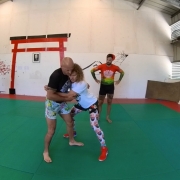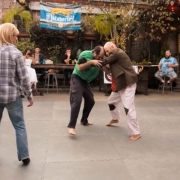How to build a BJJ competition team (Christian Graugart 1h35m)
INTRO
- Creating a BJJ team is essentially experience design
- Humans feel social comfort and true sense of achievement when they can join a tribe larger than themselves and, through hardship, grow within this. Create a tribe with the potential for people to achieve accomplishment at their individual level. All human development happens outside of comfort zone. A competition team can create a safe way to put people there.
- What defines “successful”?
- Elements of a “Time Of My Life” experience:
- High contrast experience
- Social group isolation
- Perception of expectation
- Hardship
- Accomplishment
INITIAL MEETING
- Feeling of taking part in something special
- Set expectations for commitment of participants
- Present season competition schedule
- Present training schedule
- Coach must also compete
- Team application forms
- Name
- Belt
- Current weight
- Realistic training volume
- X for which classes you can commit to attending (set personal responsibility level that coach can follow up on)
- X for which competitions you expect you can join
- Strong points
- Weak points
- Level of ambition & expectations
- Participation to help team
- Compete to try it
- Compete to win
- All in
- Don’t get too excited because many people show up!
PREPARATION
- Set training schedule
- Set competition calendar (smaller practice competitions and usually ends with one big competition as target)
- Expect 70-80% to bail early
- Give the team a name
INDIVIDUAL GAME PLANS AND “CONTRACTS”
- Base these on training/competition/what game they like/body type
- Nurture niche experts / specialists on the team (wrestler, guillotine, spider guard, lapel, half guard, triangle, leg locks etc.)
- Some game plans are obvious, some take a few competitions to see where the person feel more comfortable playing
- Build simple flowcharts
- Weight target
- Training target
- Which classes can you as a minimum commit to doing, where the coach expect a reason for you not to show up?
- Competition target
- Which competitions do we expect you join?
- Which are practice and which are to win?
- For some people the goal will be to just compete. For some it will be to win a major tournament in one year timeframe.
- Individual side-missions with cross off paper on the wall of the gym
- Present to athletes individually
- Make them sign it
- Goal is to practice and study the game plan for a full season
MAIN TRAINING ROUTINE
- Competition classes 90% drills/competition simulation & 10% individual/team corrections
- Warmup: Visualize your game plan with partner
- Most important skills: Scramble positions for three seconds, have a good guard and competition skills.
- Drill: Back on the mat
- King of the hill style rounds
- Win by: Pinning opponents back on the mat for three seconds or take the back with hooks for three seconds
- Win 3 in a row and you can go out to back of line to rest
- Drill: Long guard defense rounds (top and bottom)
- Variation 1: Top person is passing, bottom person defending
- Variation 2: Bottom person is sweeping/submitting, top person is defending
- Play LONG rounds
- + Regular guard rounds King of the hill style
- Competition simulation
- Own warm-up routine
- Cheering
- Referee
- No music
- Walk-in routine
- Practice weight cut
- Practice picking out voice in crowd
- Practice speaking up as coach
- Give immediate feedback and tips to competitors and crowd
- Team physical training
- Film practice and competitions for feedback
- Compete and evaluate (technical corrections in class)
- Train, compete, evaluate, repeat
INDIVIDUAL EVALUATIONS
- Done usually a few times over the season
- Evaluate training attendance, competition calendar, game plan
- Adjust level of ambition up/down
SECONDARY SKILLS TO PASS ON
- Involve physical trainer
- Nutrition advise before and during competition
- Warm-up routine
- Weight cutting
COMPETITION DAY
- Travel together to competition
- Make team t-shirts, gis etc
- Everyone support each other (comes natural)
- Post competition dinner/party
HUMAN / TEAM MANAGEMENT AND MOTIVATION
- Facebook group or similar for team communication
- Personal attention regardless of level or “importance”
- Social element outside of training is very valuable
- Exposure of team towards rest of academy
- Custom competition team gi with with names on
- Team photo before leaving for big, final competition of season
- Important to make everyone feel like they’re contributing to the team as a whole
- Create highlight videos from tournaments
- Nurture social aspect of competition trips
- Keep injured members involved
- Belt promotions at end of season (usually at team dinner after competition)


